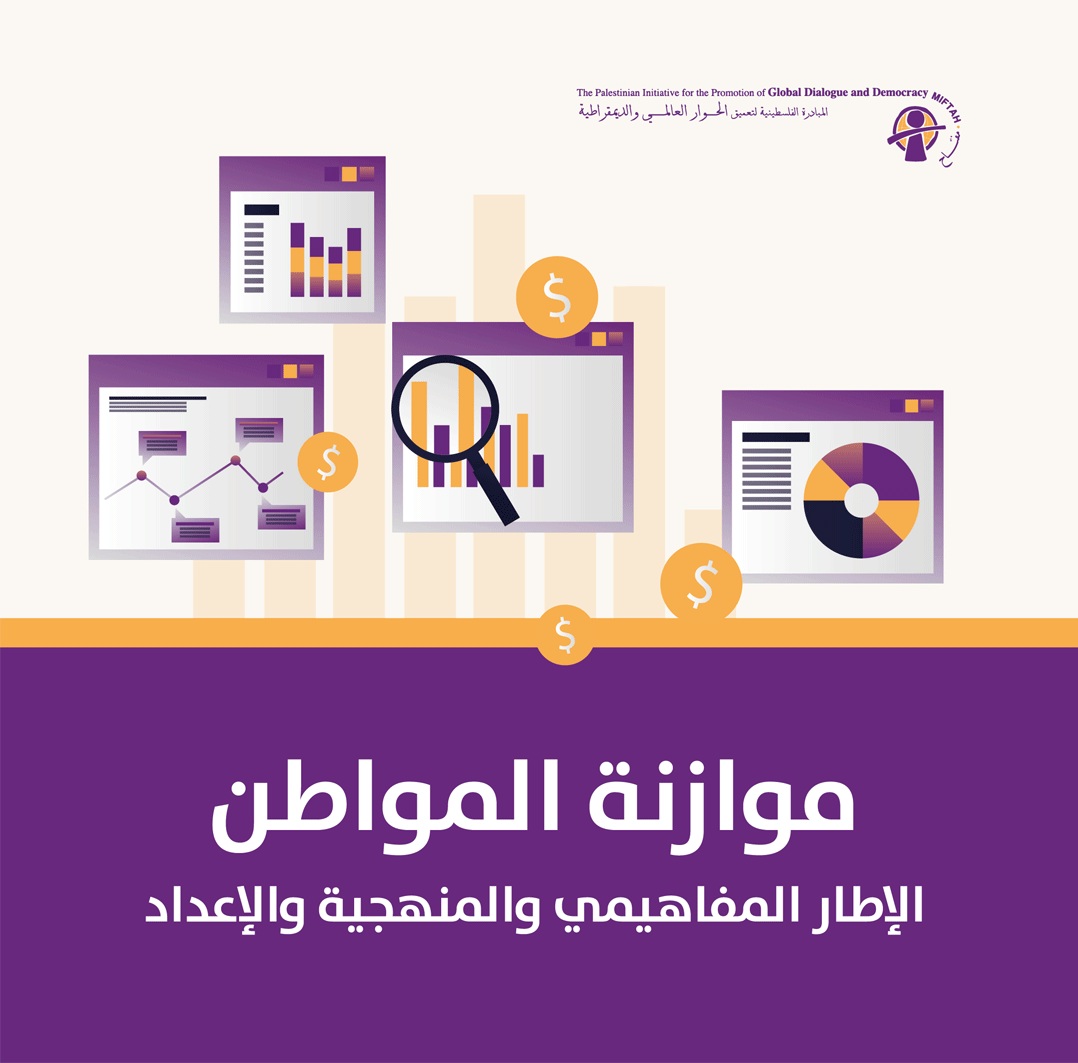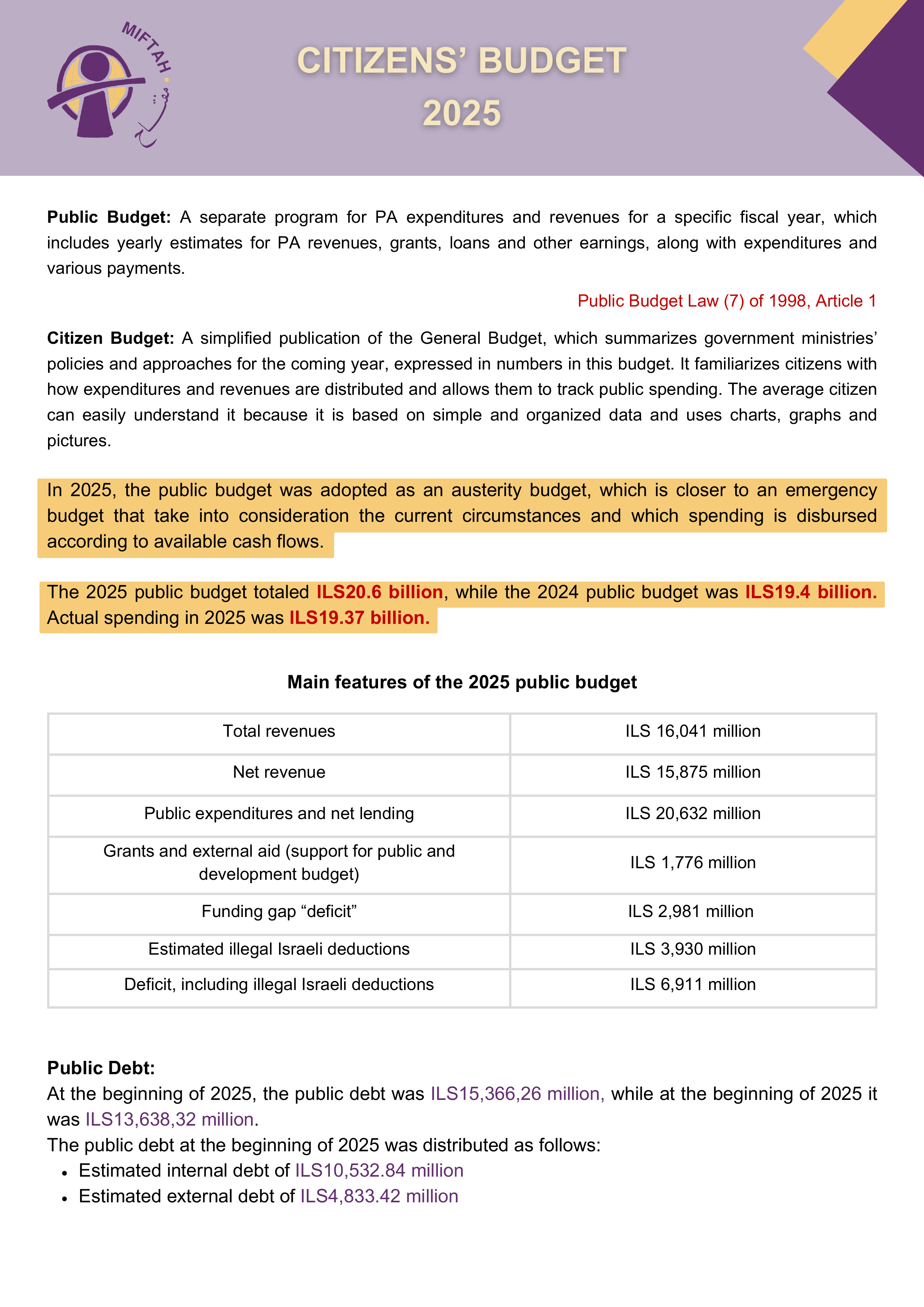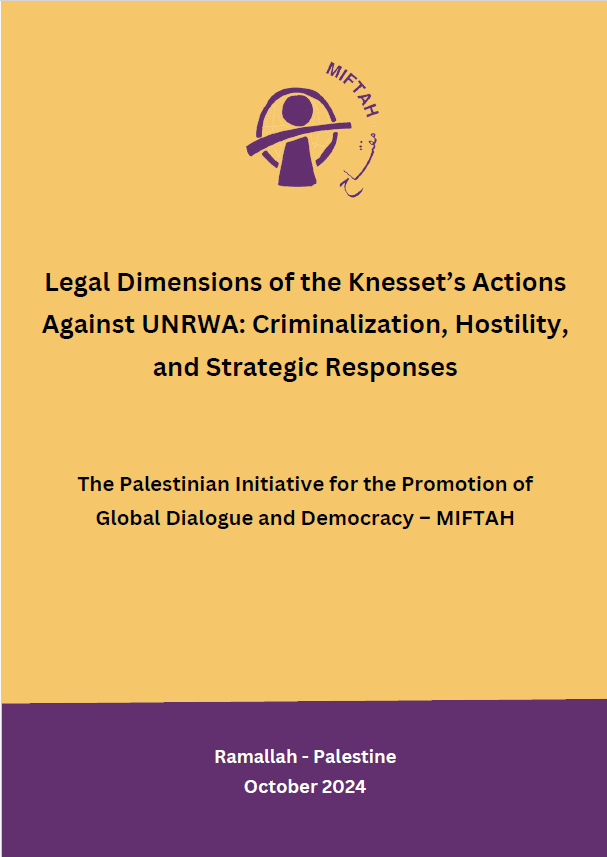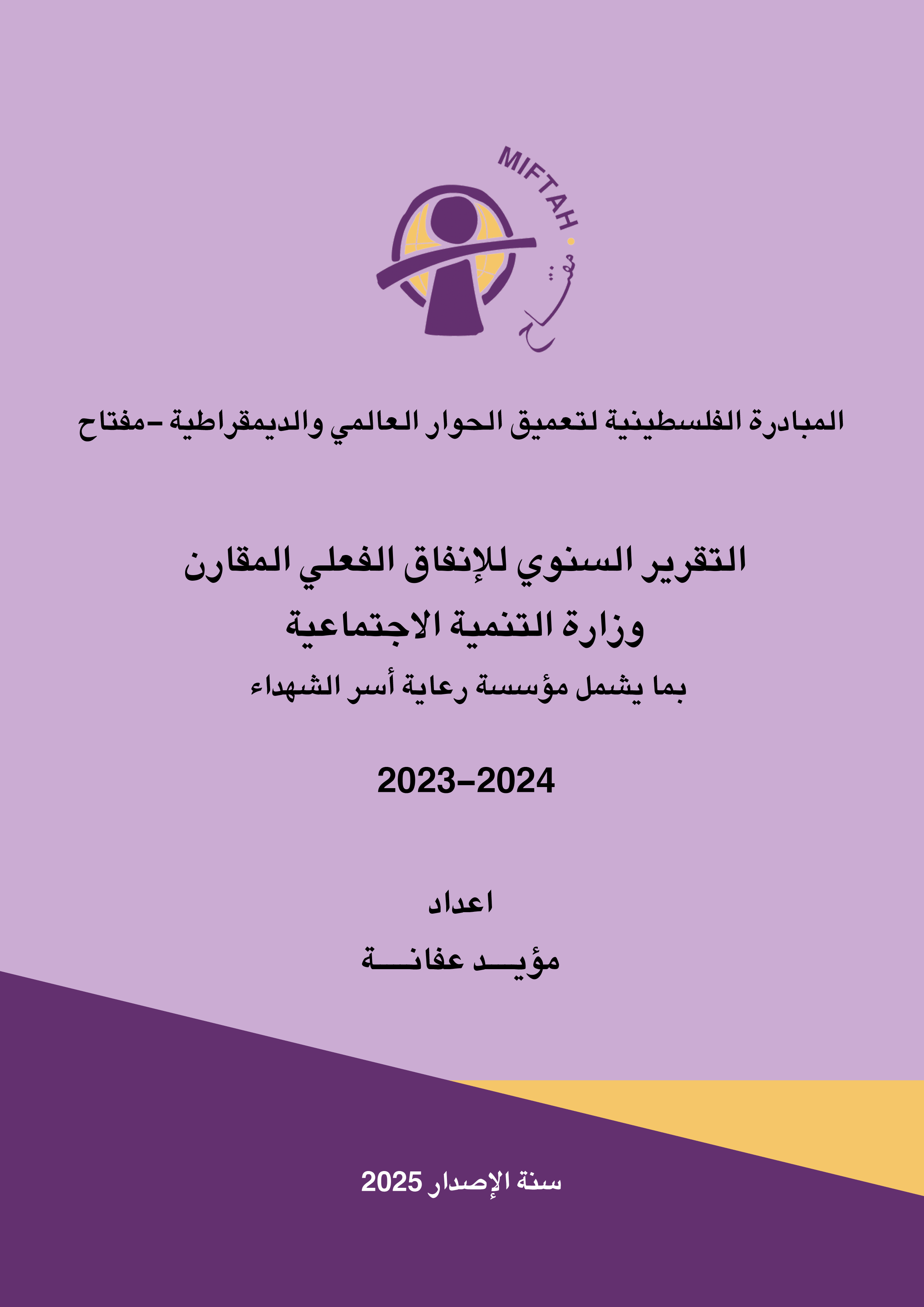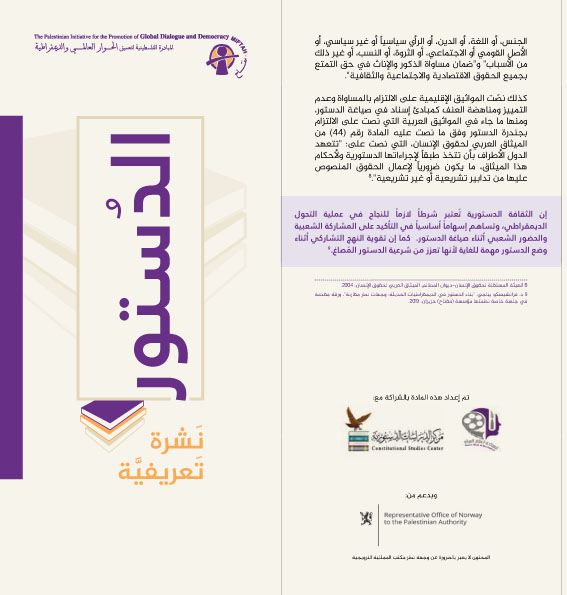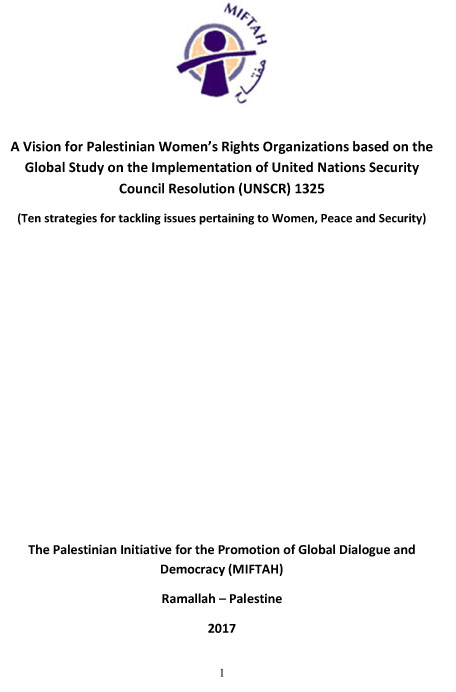MIFTAH holds open dialogue entitled 'Challenges facing the Palestinian political system'
Date posted: November 27, 2024
By MIFTAH
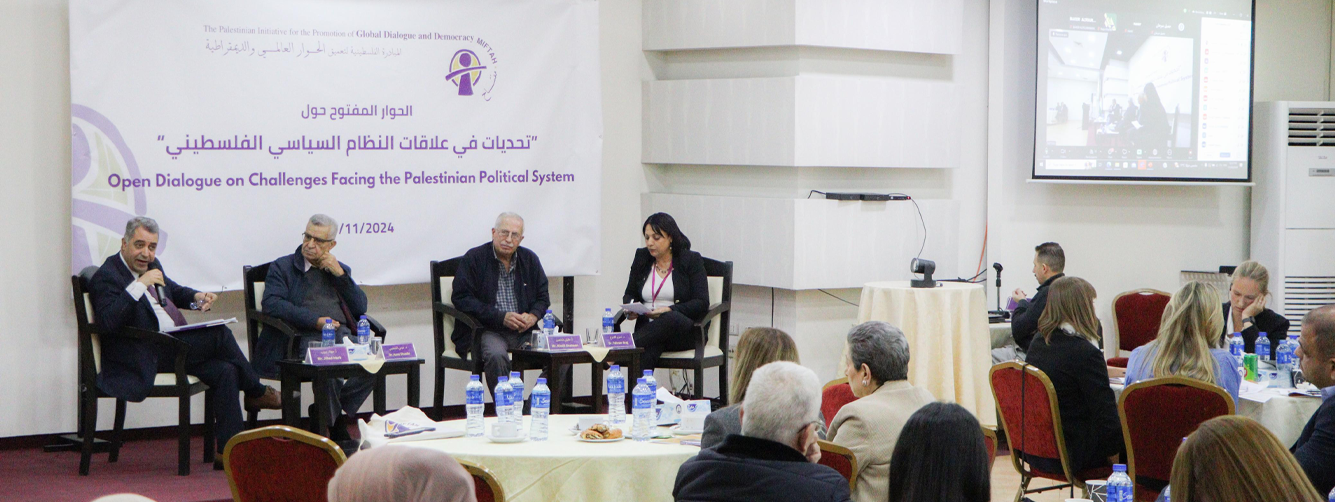
- The institutional relationship between the PA and the PLO
- The relationship between the political system and international organizations, with a focus on UNRWA as a case study
On November 20, 2024, the Palestinian Initiative for the Promotion of Global Dialogue and Democracy (MIFTAH) held a hybrid-style open dialogue entitled “Challenges facing the Palestinian political system” at the Red Crescent Headquarters in Al Bireh. The conference shed light on the challenges facing the Palestinian political system and the escalating political and humanitarian situation after the 37th Israeli government under Benjamin Netanyahu took office at the end of 2022.
The conference brought together several experts, scholars, analysts and political and national figures, in addition to official institutions, diplomatic missions, NGOs, INGOs and university students. Its focus was on pressing issues within the Palestinian political system, especially in light of the genocide against the Palestinian people and its subsequent political repercussions.
MIFTAH’s objective was to hold a discussion on political courses of action and proposals that could help develop a joint Palestinian vision for confronting challenges to the internal Palestinian relationship between the PLO and PA and relationships with international organizations, including the inflammatory Israeli assault on UNRWA.
The conference’s interventions focused on two major points: the first session discussed the institutional relationship between the PA and PLO, while the second session focused on the political system’s relationship with international organizations, with UNRWA as a case study.
In her opening address, Dr. Hanan Ashrawi, Chair of MIFTAH’s Board of Directors, stated that the PA was created as one arm of the PLO and that the relationship between the PLO and PA must be clear and integral. She stressed how the PLO is the entity that shouldered the responsibility of protecting the Palestinian people’s rights and cemented their national identity. Ashrawi called for finding ways to revive the PLO and revitalize its institutions and to discipline the relationship between it and the PA in order to achieve its national goals. She maintained this should be far-removed from slogans but rather, focused on practical steps to galvanize its role in local and international arenas.
Dr. Azmi Shuaibi, member of MIFTAH’s BoD highlighted the historical roots of the problematic relationship between the PA and the PLO, tracing the political transformations since the Palestinian declaration of independence in 1988 to today. Shuaibi indicated that the PA was created by a decision from the PLO Executive Committee, but then branched off without a clear framework to determine the institutional relationship between the two parties. He maintained that the only solution lies in a reassessment of the shape and form of the PA and the reinforcement and independence of the PLO’s role.
Opening the session, MIFTAH Executive Director, Dr. Taheer Araj, said the procedures adopted by the current Israeli government fall within a clear plan to permanently eliminate the Palestinian cause. Araj ascertained that the Israeli occupation is very clear on its intentions to continue its genocide of the Palestinians to forcibly displace them, not only as a future step but one applicable in the near future.
The conference coincided with the ongoing escalation of Israeli violations against the Palestinian people, including increasing violence, settlement expansion and settler attacks in addition to the genocide on the Gaza Strip, which began on October, 2023. The Israeli government is also continuing to undermine the PA through attempts to destroy it financially and politically and by classifying PLO factions and Palestinian national movements as “terrorist” all of which threaten the stability of the Palestinian political system. The participants also discussed the ongoing Israeli assault on official and international Palestinian institutions, including UNRWA.
The final segment of the conference was a discussion of Palestinian options for facing these challenges, with a focus on the need to develop a joint Palestinian vision at the internal and international levels, to guide Palestinians in their struggle for freedom and independence and to end the genocide on occupied Palestinian land.
MIFTAH releases 2021-2022 comparative actual spending reports for the social and security sectors, including social justice and gender indicators
Date posted: April 04, 2023
By MIFTAH

MIFTAH recently released 2021-2022 comparative actual spending reports for the social sector (health, education, higher education and scientific research, social development and labor), and for the first time, the security sector (Ministry of Interior and National Security). The reports were based on annual financial data released by the Ministry of Finance in Palestine for 2021-2022 and on an accrual basis.
The data showed that the Ministry of Interior and National Security had the highest percentage of actual spending in 2022, accounting for 22.8% of overall public expenditures, or ILS3.68 billion. This was a slight increase from the Ministry’s share in 2021. Meanwhile, actual spending on the education sector (Ministry of Education, Higher Education and Scientific Research) stood at 21.5% of overall public expenditures, or ILS3.48 billion. This was also an increase from the education sector’s share in 2021, which was 20.6% of public expenditures.
Moreover, actual spending on the Ministry of Health also increased in 2022, comprising 15% of overall public expenditures, at a sum of ILS2.4 billion. This was higher than in 2021, where its share was 14.4%. As for the Ministry of Social Development, actual spending was still low, amounting for 6.2% of overall public expenditures in 2022, compared to 5.8% in 2021. The Ministry of Social Development’s actual spending in 2022 was approximately ILS1 billion. As for the labor sector, actual spending on this sector in 2022 was 0.31% of overall public expenditures, while in 2021 it was 0.28%. Actual spending on the labor sector in 2022 was ILS50.1 million.
Upon review of actual spending reports of the targeted ministries from a gender and social justice perspective, it is clear that actual spending on the Ministry of Social Development does not coincide with the scope of its responsibilities as the forerunner of the social sector in Palestine, including its programs for combatting poverty and the protection of poor and marginalized social sectors. Moreover, non-compliance to the disbursement of payments for poor families within the CTP continued according to estimates, whereby only two of four installments for 2022 were disbursed, one at minimum value. This adversely affected the financial security of the most underprivileged and marginalized sectors of society, in addition to the insufficient estimated budget and actual spending on the social protection program, in spite of its importance in providing protection and social services to battered women, children, special-needs persons and the elderly.
The data also pointed to the low percentage of women working in the security sector, which stood at 6% of the total number of workers in this sector, while they comprised 46% of the civil sector. This shows a gap in actual spending on the security sector from a gender perspective, given that the lion’s share of actual spending in 2022 was on salaries and wages. Hence, women only benefited very little from these allocations, which were nearly ILS2.9 billion in 2022.
The data also indicated that the development expenditures for the Ministry of Labor were only ILS4.5 million in 2022, even though planned development expenditures were ILS32 million, which is much higher. This casts a shadow on gender-related programs and projects, which were allotted sizeable budgets within development expenditures, such as creating sustainable opportunities as alternatives for Palestinian men and women working in settlements, for which ILS10 million were earmarked.
Even though there was an increase in actual spending in 2022 at the targeted ministries in general, this increase was mainly concentrated on salaries and wages. In spite of the importance of providing a decent life for employees, there is still a need to increase spending on development expenditures, since they are at the forefront of developing government services, including the nationalization and institutionalization of various social services.
MIFTAH concludes town hall meetings on political participation and citizens’ rights for women and youth
Date posted: January 09, 2023
By MIFTAH

Ramallah – 29/12/2022 – Within its efforts to promote democratic values and the peaceful transfer of power within the Palestinian government system, MIFTAH’s field advisory team completed over 100 town hall meetings in the second half of 2022. The meetings were held in coordination and cooperation with CSOs, LGUs and grassroots organizations and targeted women and youth in several West Bank and Gaza Strip districts. The objective of these meetings was to raise awareness among the electorate on the electoral system in Palestine and on civil society demands to increase women and youth participation in local and general elections as candidates and voters, on the premise that this boosts their presence in decision-making levels and involves them in public affairs.
The town hall meetings included several exchange visits between LGU members in the various districts. The women shared the experiences and challenges they faced after becoming council members. The meetings focused on the concept of citizenship within a broader definition of the various forms of political participation and the importance of involvement from youth and women in public life. They also pointed to the different forms of democracy and the main pillars of the democratic society Palestinians seek to create. The participants furthermore discussed the various forms of electoral systems and shed light on the gaps in electoral laws regarding the presence of women and youth.
The participants pointed to the importance of periodic legislative and presidential elections and the danger of the ongoing absence of the PLC on matters pertaining to civic peace. They also warned against the absence of oversight and accountability, maintaining that the defunct PLC has contributed to shrinking civic space and public freedoms and therefore, the ability or desire to become involved in political life, especially for women and youth. In most of the meetings, the participants also indicated that the absence of a regular democratic process in Palestine contributed to the overall exclusion of youth from participation and to the marginalization of the role of women in Palestinian political decision-making.
The town hall meetings stressed on the importance of pressing for legislative, presidential and local elections in all West Bank, Jerusalem and Gaza Strip districts. They also endorsed the demand for equality in electoral laws, starting with raising the women’s quota to a minimum of 30%, raising the candidacy age and lowering the threshold. They urged Palestinian factions to assume a key role in the process of inclusion for women and youth in the public sphere and to prevent the progression of tribalism in the democratic process. The attendees emphasized the importance of monitoring the performance of LGUs in their interaction with local communities and the consistency of their meetings. Finally, they said female council members must be given the opportunity to exercise their role in their respective councils as equals to their male counterparts.
MIFTAH holds town hall meetings on an annual basis as part of its awareness campaign on citizens’ rights and the promotion of the democratic approach for a peaceful transfer of power, in addition to the involvement of women and youth in elections as both candidates and voters. Each year, through these town hall meetings, MIFTAH aims to reach the widest possible segment of the electorate and the different social sectors in all parts of Palestine.
MIFTAH completes training workshop in the Gaza Strip on family protection and advocacy
Date posted: January 05, 2023
By MIFTAH
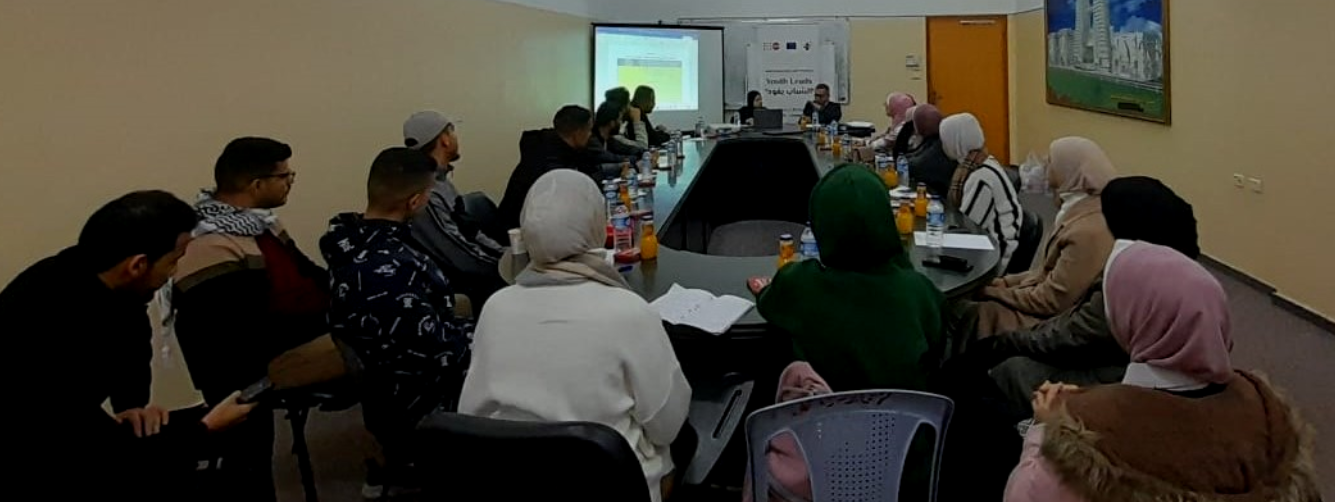
Gaza – 2/1/2023 – MIFTAH recently completed a training workshop on measures and regulations on family protection in the Gaza Strip. The workshop was part of MIFTAH’s strategic objectives to prioritize family issues in communities and to support local institutions in increasing awareness on citizenship and constitutional rights for Palestinian women and on combatting all forms of GBV and discrimination in Palestinian society.
The workshop’s objectives included providing institutions with important information on the legislations, laws and measures for family protection in effect in the Gaza Strip, in a bid to enhance the oversight role of CSOs in holding accountable official parties responsible for enforcing these measures and legislations. The training also included offering institutions the necessary mechanisms for managing digital and media campaigns to press for the ratification of laws and legislation that protect women’s rights.
The discussions focused on a number of points, including legal (including sharia law) rebuttals to claims from parties opposing legislation, including the Family Protection Law. They also discussed how applicable this law would be in the Gaza Strip once ratified by the President.
The participants unanimously agreed that they supported adoption of the law, giving no credence to the claims of more extreme elements in Gaza on the Family Protection Law. They called on MIFTAH to hold general, open meetings with the public to introduce them to the law and its importance, so that they could defend themselves from the extremist discourse surrounding it.
Opinions and impressions
One of the participants, Latifa Shatat, said such training workshops were crucial for every Palestinian, male and female. “It is great we are pressing for protection laws such as the Family Protection Bill. This law will have tremendous impact on society as a whole. I can say from experience as a social and mental health worker that protection is the most important element in our work, especially in cases involving women and children, who are the most vulnerable social sectors. I commend MIFTAH and anyone who participates in spreading a culture of nonviolence, protection, justice and equality.”
Meanwhile, Haifa Al Araj said the training offered important details about the Family Protection Law and also ways of conducting initiatives and activities that could produce positive results in mobilizing support it.
Another participant, Hatem Abu Ta’a, said the training was a new starting point for him as an institution director in terms of integrating the demand to implement the Family Protection Law in all advocacy and lobbying activities and programs. He said he became more aware of the impediments to the law’s implementation at the official and social level, saying, “This training reminds us to renew our calls to demand implementation and ratification of the law at the official level.”
Meanwhile, Mahmoud Abu Rabee said ratification of the Family Protection Law would be a huge step, for women and children especially. “This law will amplify women’s voices and their ability to access help with stronger and more supportive centers throughout the homeland. As a strong supporter of this bill, I want to stress on the importance of civil society institutions explaining the clauses in the bill pertaining to CEDAW and to also focus on working with parties that oppose the law in particular.”
The training workshop is part of MIFTAH’s “Policy dialogue and Good Governance” Program, which aims at influencing public policies and legislation in favor of protection for citizens’ rights in Palestinian society, based on the principles of social justice and respect for human rights.
MIFTAH completes two trainings on 'Elections and women and youth political participation” and “The application of international human rights conventions against discrimination and gender-based violence'
Date posted: January 03, 2023
By MIFTAH
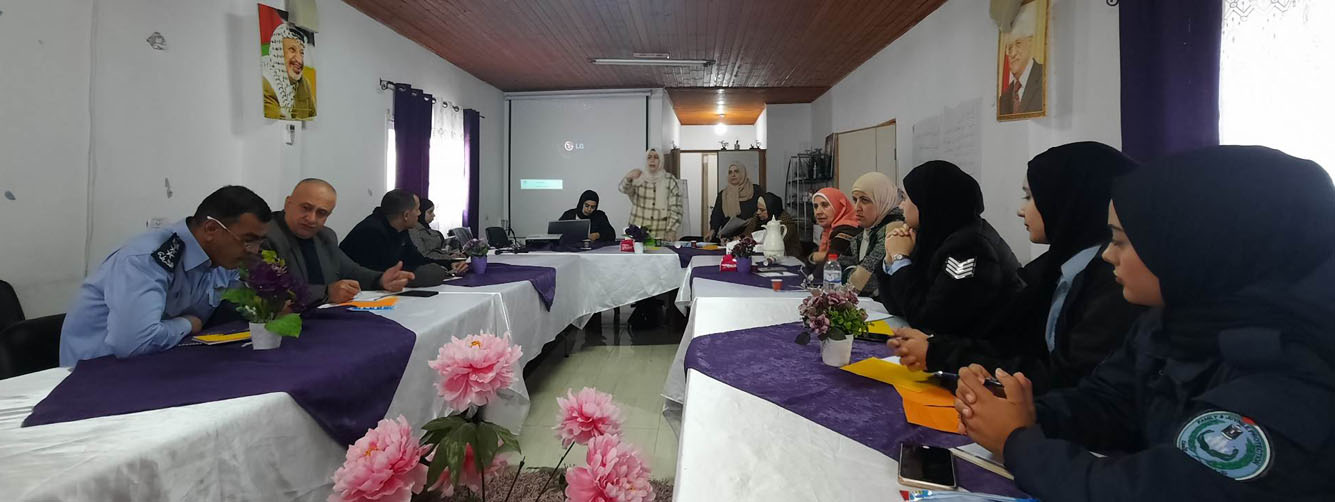
Ramallah – 27/12/2022 – MIFTAH recently completed two workshops on “Elections and women and youth political participation” and “The application of international human rights conventions against discrimination and gender-based violence”, through its field advisory team. The trainings targeted grassroots organizations and CSOs in the West Bank, including Jerusalem, and the Gaza Strip. A group of officers from the Police’s Family and Juvenile Protection Department in the West Bank also attended. The trainings are part of MIFTAH’s contribution to expanding the scope of field work within institutions focused on political participation and empowerment of youth and women leaders, so they become full participants in the local and general elections process. They are also aimed at increasing their knowledge on ways to implement human rights conventions pertaining to combatting discrimination and gender-based violence, in order to provide a legislative and procedural environment that enables women to access protection and security services.
The trainings resulted in the development of approaches for action with the targeted institutions and parties, including an emphasis on efforts to promote social awareness on citizenship rights and duties and to integrate these values in cultural and social upbringing. They also stressed on the importance of formulating empowerment and capacity-building programs targeting women and youth within the context of political participation and their involvement in public affairs and finally, promoting the principles of democracy, including the peaceful transfer of power.
The trainees stressed on the importance of social oversight in regards to holding local government units [LGUs] accountable on priorities for their communities, especially regarding the access of services, based on the principles of good governance. The trainings also highlighted the importance of promoting field work through investing in digital media in particular, by sharing the success stories of women and youth in leading initiatives and taking measures that have a possible impact on their communities. This is based on the premise that this helps to change stereotypes regarding the capabilities and competence of these sectors.
The trainings highlighted the need for cooperation and networking between the police and institutions on issues pertaining to women and girls who are victims of violence, through enacted measures, including the National Referral System. This is in addition to working in partnership with grassroots organizations for battered women and the relevant official institutions, including the Social Development and Health Ministries and Departments, Police Protection Departments and CSO service providers. They also emphasized the crucial work of the Family Protection and Juvenile Departments and protection-related institutions in creating awareness and information programs on the procedures employed by police and government departments and on communication methods to enable women, girls and special-needs females to benefit from protection and shelter services. Participants concurred on the need to increase efforts towards lobbying and advocacy campaigns calling for the ratification of the Family Protection Law, which supports the enforcement of the rule of law and the separation of family protection departments from police departments, out of respect for the privacy of domestic violence victims. The workshops furthermore, emphasized the need for safe houses (shelters) and rehabilitation centers in all districts.
These trainings are part of MIFTAH’s Good Governance and Democracy Program, which aims to influence public policies and empower components of Palestinian society to press for social justice and the protection of civil liberties. The program also promotes democracy and building state institutions, based on the principles of good governance, the Palestinian Declaration of Independence, the Basic Law and international conventions pertaining to the fostering of human rights in Palestine.
MIFTAH holds meeting for LGU members in West Bank districts to share experiences
Date posted: January 03, 2023
By MIFTAH
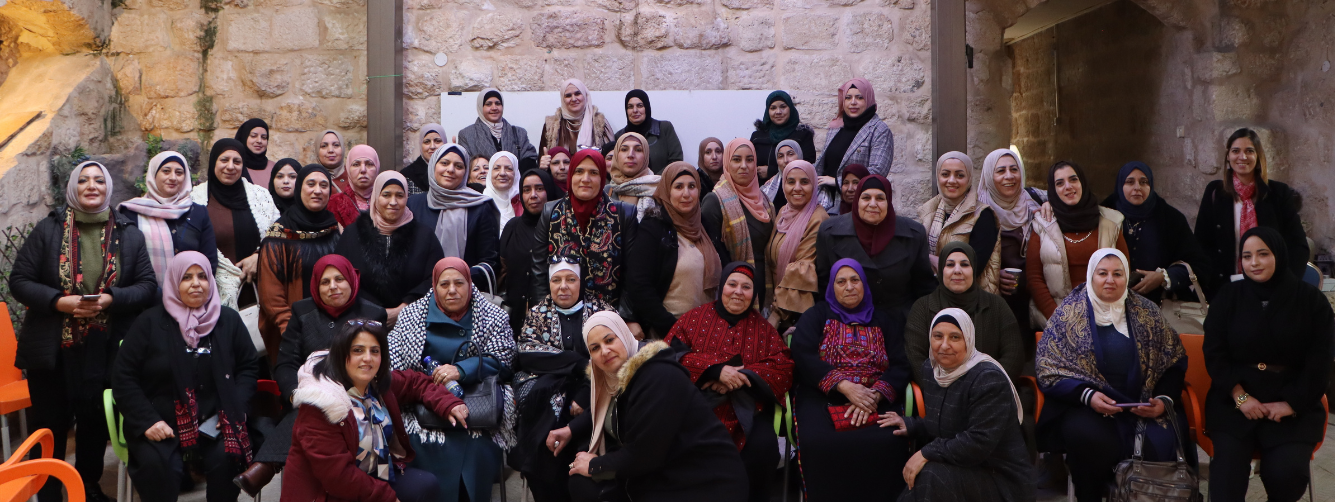
Bethlehem – MIFTAH capped off its 2022 interventions by holding a meeting in Bethlehem for female LGU members from West Bank districts so they could share their experiences with one another and listen to the needs and challenges of fellow members in their respective local councils.
The members shared their experiences before running in elections and the challenges they faced during the first and second phase of local elections. They also talked about their experiences inside their respective LGUs and discussed ways of increasing women’s participation in the election process.
The women agreed that one of the biggest challenges they all faced was society’s view towards women’s participation and the pressing need to amend the elections law to support increased participation of women and youth in elections. They also stressed on the need for more female representation in LGUs including a higher women’s quota. The women also maintained the necessity for a legal clause to make the replacement of any resigning female member with another female member, a binding obligation.
The women members called for ongoing support by increasing awareness on laws and measures pertaining to LGUs and mechanisms for decision-making within them, to guarantee active and effective participation.
The meeting resulted in several recommendations, most significantly the need to network with the Ministry of Local Government and CSOs. Another recommendation called on members to continue to exchange experiences in a bid to overcome obstacles they may face at the various stages of the democratic process. Finally, they recommended that it is important to include male LGU members in upcoming interventions so that they complement each other in their work.
This meeting is part of a series of activities organized by MIFTAH in 2022 to support the political participation of women and youth through MIFTAH’s field advisory team in the various districts, with funding from the Norwegian Representative Office and War Child.
MIFTAH caps off youth summer camp for law students at Palestinian universities
Date posted: December 27, 2022
By MIFTAH
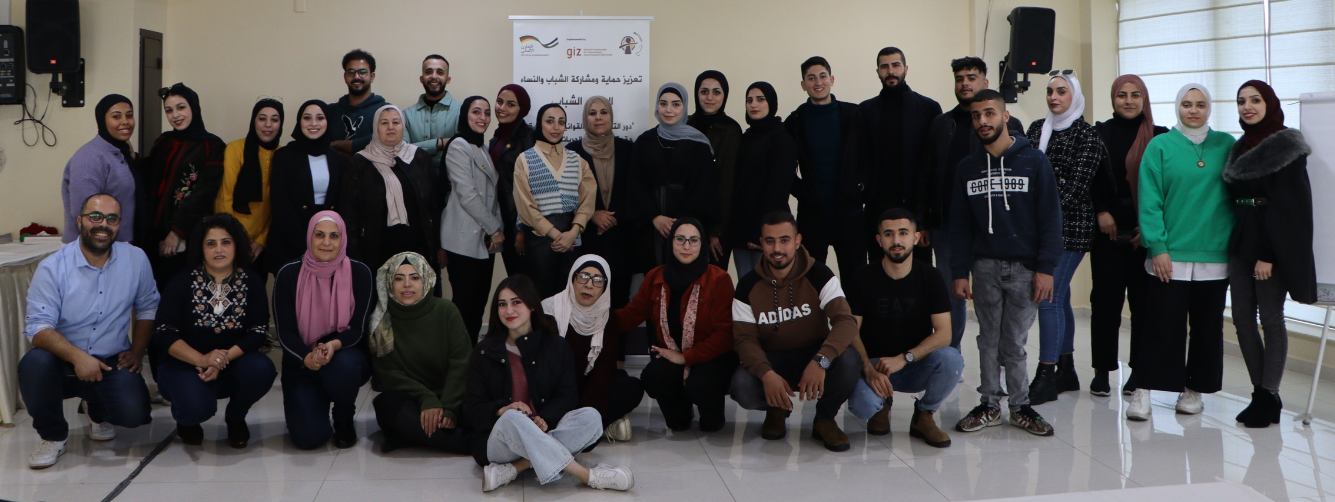
Ramallah – 19/12/2022 – MIFTAH recently held a youth camp for law students at Palestinian universities, civil society and government representatives, the Palestinian Bar Association and the Family and Juvenile Protection Department within the Police. The camp was aimed at promoting youth involvement in public affairs and providing them with information and contacts on social issues, with a focus on social protection and legislation on domestic violence. During the sessions, participants held discussions on the constitutional rights of Palestinian women and systems of social protection.
The conference constituted a space for information and dialogue on the Family Protection Law and the National Referral System. The opening session included several speeches, starting with MIFTAH Executive Director, Dr. Tahreer Araj, who spoke about the importance of the role of Palestinian youth as human rights defenders and citizens’ rights agents for all sectors of Palestinian society.
Dr. Daoud Al Deek, advisor to the Prime Minister on strategic affairs, confirmed that the Family Protection Law is at the top of the government’s priorities and agenda to discuss its ratification. Meanwhile, Khadijeh Hussein, Director of the Policy and National Legislation Department at the Independent Commission for Human Rights, presented on the philosophy behind the Family Protection Law and the Referral System. She said both are means of protecting women and vulnerable and marginalized groups from the risk of violence. She continued that discussion over the Family Protection Law began around 2005 and has been in ‘difficult labor” ever since. Hussein pressed for a serious stance on adoption of the law, pointing out that in the past three years, 100 Palestinian women have been killed.
Furthermore, Bar Association representative, Rawiya Abu Zuheiri, stressed on the importance of ratifying the Family Protection Law to put an end to domestic violence and to promote civic peace. This was followed by a presentation from Lieutenant Colonel Louay Wahdan from the Family and Juvenile Protection Department, who showcased the challenges and tasks of the unit and the procedures employed in domestic violence cases. He noted that they face several challenges in enforcing the law when it comes to matters of family protection.
The floor was then given to Dr. Azmi Shuaibi, member of MIFTAH’s Board of Directors, who emphasized the importance of protecting the social contract in Palestinian society, which, he reminded the participants, was in the Declaration of Independence. He noted that the problem Palestinian youth and women are up against is the absence of the PLC and the lack of a supportive incubator for their issues and demands.
Dr. Omar Rahhal, from Shams Center pointed to the absence of any political will to ratify laws of a social nature while decisions pertaining to economic issues are made without delay.
The youth camp was conducted over the course of three days, including a presentation by Ashraf Abu Hayya, from Al Haq, who introduced the participants to the philosophy of the Family Protection Law, its objectives and articles and the role of relevant parties to enforce it. Mr. Mahmoud Franji, meanwhile, identified the course of action pertaining to the National Referral System and its services for protecting battered women.
This was followed by training sessions and discussions in which participants talked about the possible mechanisms available to youth groups to plan campaigns investing in digital media. They also discussed ways to advocate for mechanisms and services for the protection of battered women and for raising awareness on the necessary legislation in this regard. They maintained that this legislation is imperative in order for women and girls to access protection and justice.
The camp resulted in the creation of five campaigns and initiatives with targeted messages on family protection, varying according to group and district. Meanwhile, MIFTAH will follow up and support the youth groups in implementing the campaigns throughout next year. MIFTAH will also publish the literature from the youth camp, presented by the various participants.
The youth camp is an interactive platform aimed at promoting youth participation in the public sphere, with a focus on fostering dialogue on social issues pertaining to women and girls.
MIFTAH holds open session to discuss proposed amendments to the Local and General Elections Law
Date posted: December 08, 2022
By
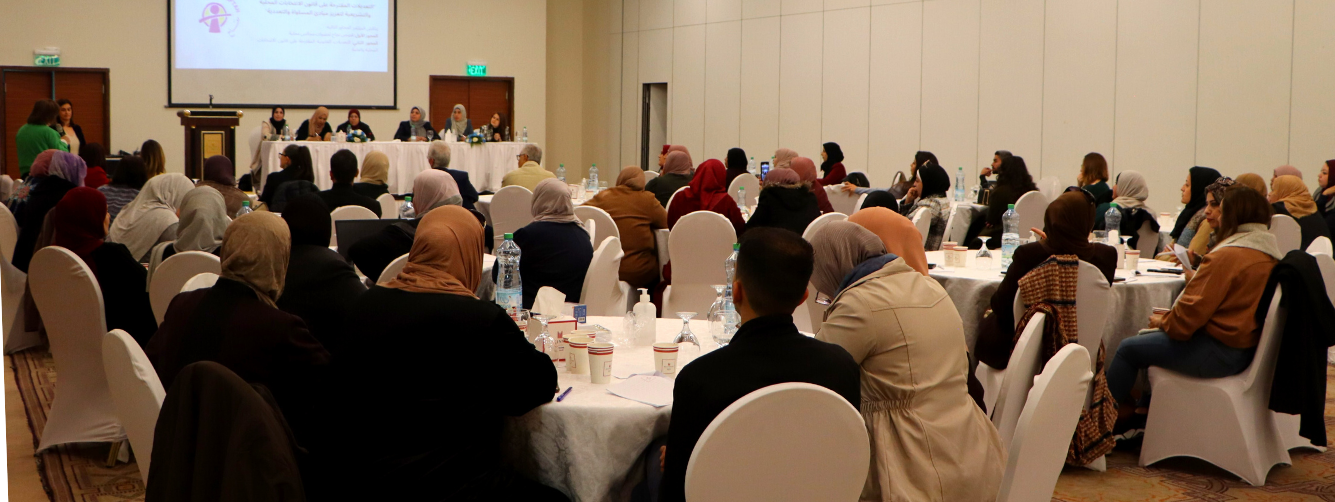
Ramallah 5/12/2022 – MIFTAH recently held an open session entitled, “Proposed amendments to the Local and General Elections Laws to promote the principles of equality and pluralism.”
The conference was opened by MIFTAH Executive Director, Dr. Tahreer Araj, who said the conference was part of MIFTAH’s efforts to promote active political participation among all social sectors, particularly youth and women. She said the objective of this was to follow up on the efforts of civil society institutions in pressuring decision-makers to make the necessary legal amendments that would bolster citizens’ political participation and the principles of democracy. Araj stated that since 2003, MIFTAH has been involved in national efforts to develop the Elections Law through several interventions aimed at achieving political reforms and adopting the proposed amendments to the law.
Several local council members then shared their success stories and experiences in running in the elections and then winning a seat in their local councils. The women also spoke about the social challenges they overcame and how they were determined to serve their communities.
This was followed by several discussions and commentary among the audience and council members before CSO representatives and the Central Elections Commission [CEC] presented the proposed amendments to the law.
During the second session, the speakers showcased the proposed legal amendments to the law and their direct impact on the political participation of women and youth. They maintained that the purpose of these amendments was to arrive at a just elections law that represents the various social sectors and promotes the values of participatory democracy, based on women and youth reaching decision-making positions.
Closing statement
“In conclusion, MIFTAH’s meeting on the proposed amendments to the Local and General Elections Laws posed several core points, which impact the participation of women and youth as members of local councils. It also focused on the challenges these two sectors face, whether in terms of their candidacy, elections campaign or in conducting their tasks as elected members of their local councils. Most of these challenges are linked to social pressures and stereotypes of the role of women in society and family, in addition to the absence of laws and regulations that protect and support the participation and representation of women and youth in local councils.
The most significant challenges women face are as follows:
- The lack of political will to support the participation of women and youth.
- Lack of acceptance from the family and community of women representatives in local councils.
- Lack of acceptance of women’s photos used in election campaigns, whereby some women were subjected to slander, pressure and threats.
- Reluctance to attend preparatory elections meetings and local council meetings.
- Limited scope of powers and roles for women in local councils as a result of male attitudes towards women’s participation in the public sphere.
- Burdensome responsibilities of female members of local councils because of their participation in various committees, which drown them in multiple tasks.
Recommendations:
- Stressing on the importance of periodical local and general elections and respect for constitutional foundations
- Adopting a law that reaffirms the principle of equality, protects citizens’ rights and the representation of all social sectors, through initiating a social dialogue on the shape and form of the desired electoral system, with the participation of all parties as such:
- A law that protects civic peace and does not allow political corruption
- Determining the use of acclamation lists by social referendum.
- Lowering the candidacy age to offer opportunities for youth to engage in political life
- Adopting a 30%-minimum women’s quota a as a stepping-stone to equality in all local councils.
- Lowering the threshold to allow the participation of small parties and marginalized sectors.
- Direct election of the president, which calls for expanded dialogue
- In light of the defunct PLC and slow pace in amending laws, there should be a focus on amending procedures that protect the participation of women and youth, through the following:
- Reconsideration of women’s ranking in lists so they occupy advanced slots (Nos 2 and 4 as a minimum)
- Emphasizing respect for the spirit of the law through ensuing at least minimum representation of women inside councils. If a female member resigns, she should be replaced by another female member.
- Follow-up on the resignations and withdrawals of women from local councils.
- Stressing on commitment to the code of conduct for local councils and to the role of the council and regulating the relationship between members and the council president.
- Bolstering the empowerment of women and youth who wish to participate in the elections on issues pertaining to the law, dealing with the media and preparing electoral platforms.
MIFTAH holds meeting to discuss proposed amendments to the Local and General Elections Laws
Date posted: December 01, 2022
By MIFTAH
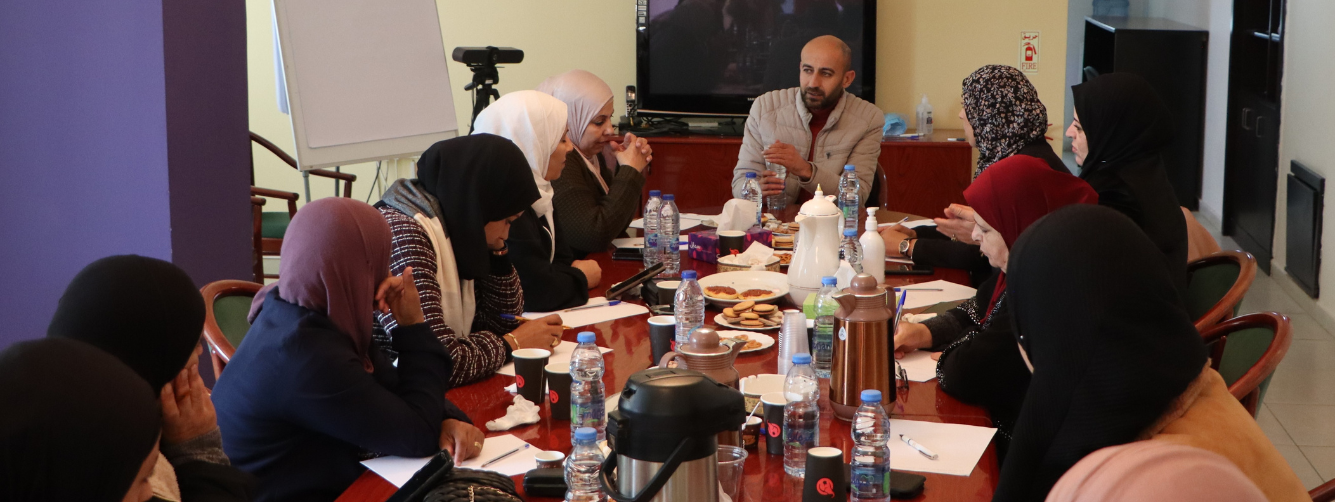
Ramallah – 28/11/22 – MIFTAH recently held a meeting in partnership with War Child to discuss the proposed amendments to the Local and General Elections Laws in a bid to promote the principles of equality and pluralism. The objective of the session was to reach a consensus over the proposed legal amendments to the 2005 Local Elections Law, No. 10 and the 2007 General Elections Law, No. 1 and the necessary steps to accomplish this.
Several grassroots institutions from central West Bank districts and female members of town and village councils attended the meeting, with the aim of shedding light on the legal gaps in the current elections laws and the challenges that arose during the local elections at the beginning of this year.
The participants discussed the exclusion of legal amendments even though political parties and influential community players were in agreement over them. This left that the issue of women and youth representation ineffective at the decision-making levels in the absence of a legal system that guarantees their access and participation.
The attendees also stressed on the importance of amending the elections laws to guarantee that the candidacy age is lowered, to allow more opportunities for youth to enter into the sphere of political participation and to increase the women’s quota to 30%, in accordance with PLO Central Council decisions. They also focused on the need to adopt amendments pertaining to the electoral threshold, the number of candidates on electoral lists and the option of allowing citizens to elect their Local Council heads. They added the need to combat the use of acclamation in elections by emphasizing democratic values based on the right to choose.
By holding these sessions, MIFTAH seeks to create a national consensus on the proposal legal amendments to the elections law and to continue cooperation with active parties, factions and civil society organizations in pressuring decision-makers to adopt these amendments. Ultimately, this would allow marginalized social groups to participate in a more active manner.
MIFTAH caps off workshop with Al Istiqlal University cadres on CEDAW and UNSCR1325 manual
Date posted: November 19, 2022
By MIFTAH
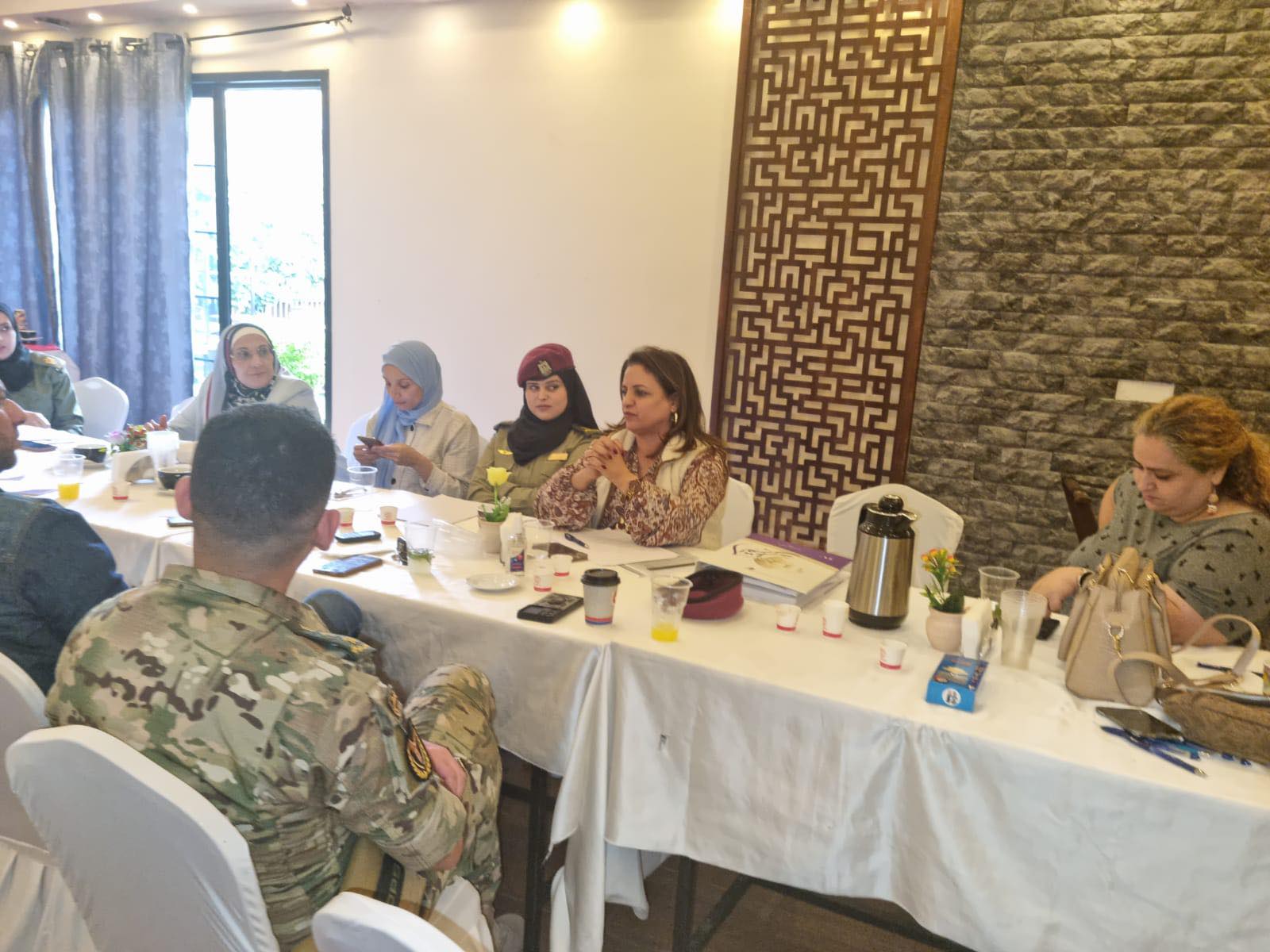
Ramallah – 9/11/2022 – MIFTAH recently held a follow-up workshop for cadres at Al Istiqlal University in Jericho on the use a manual for PA security services on CEDAW and UN Resolution 1325. The workshop covered the manual’s concepts and performance, along with mechanisms and tools to ensure that information is properly conveyed to the audience.
The workshop is part of MIFTAH’s Good Governance and Democracy program, in cooperation and coordination with Al Istiqlal University and part of their mutual interests to enforce the law and promote the principles of democracy and human rights, on the basis of national laws and legislation. It is also part of MIFTAH’s efforts to promote Palestinian women’s participation in decision-making positions and efforts to guarantee their safety, protection and easy access to justice. This is in addition to contributing to the development of policies and procedures pertaining to case files of Palestinian women and girls, in light of sexual and compound violence-based discrimination stemming from patriarchal culture, the Israeli occupation and the internal rift. These policies and procedures are based on WPS references and legal frameworks to which the State of Palestine adheres.
MIFTAH believes it is imperative to continue these workshops and courses to increase knowledge among university students on international human rights conventions, including The Convention on the Elimination of All Forms of Discrimination against Women (CEDAW). It is also important to highlight the intersectionality of these conventions with national treaties and the Palestinian Basic Law. The trainings and workshops focus on opportunities to nationalize and commit to agreements and UN resolutions at the Palestinian level.
Dr. Kifah Manasra, lecturer at Istiqlal’s Faculty of Law, said MIFTAH’s training provided the trainees with crucial information and strengthened their capacity to analyze and defend human rights concepts and principles. She also pointed to how the training covered international conventions and linked them to national treaties and the Basic Law.
The trained cadres expressed their willingness to move forward with the dissemination of the human rights perspective and respect for public freedoms included in the conventions, Palestinian Basic Law and Declaration of Independence. They also pointed to the need for a plan to disseminate and implement conventions on human rights and anti-discrimination and respect for public freedoms.
14 Emil Touma Street,
Al Massayef, Ramallah
Postalcode P6058131
P.O.Box 69647
Jerusalem
972-2-298 9490/1
972-2-298 9492
info@miftah.org




